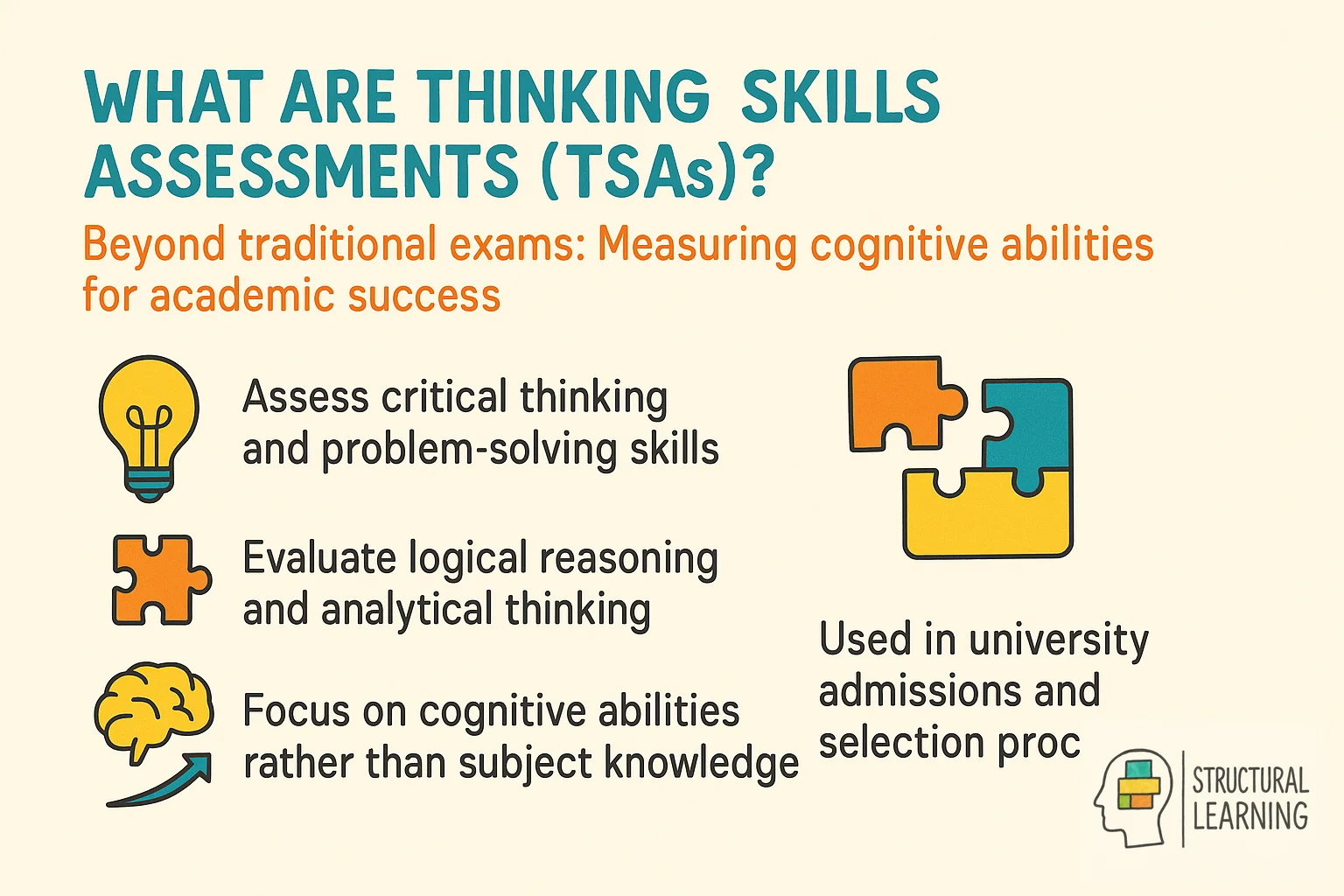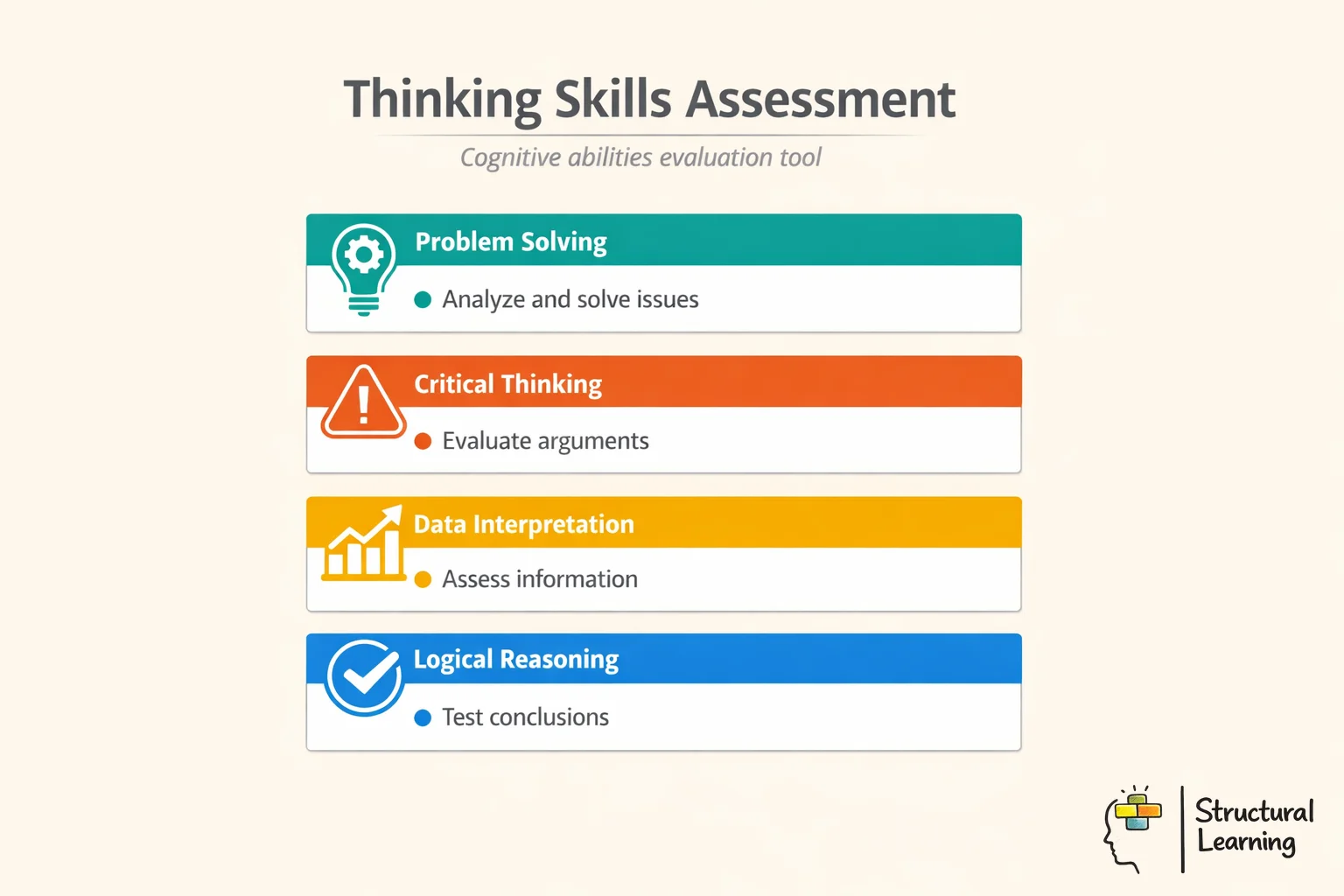Thinking Skills Assessments
Discover comprehensive methods to assess critical thinking and problem-solving skills effectively, from Bloom's Taxonomy to university admission tests.


Discover comprehensive methods to assess critical thinking and problem-solving skills effectively, from Bloom's Taxonomy to university admission tests.
| Level | Description | Question Stems | Assessment Tasks |
|---|---|---|---|
| Remember | Recall facts and information | What, when, who, list | Multiple choice, matching |
| Understand | Explain ideas and concepts | Explain, describe, summarise | Short answer, diagrams |
| Apply | Use knowledge in new situations | How would you use, demonstrate | Problem-solving tasks |
| Analyse | Break down into components | Compare, contrast, examine | Case studies, investigations |
| Evaluate | Make judgements based on criteria | Justify, assess, critique | Essays, debates, reviews |
| Create | Produce new or original work | Design, construct, develop | Projects, portfolios |
Thinking Skills Assessments (TSAs) are structured tests designed to evaluate an individual's cognitive capabilities, particularly in the context of university admissions. Historically associated with the entry criteria of prestigious universities, TSAs have become a critical tool in educational settings, including schools and colleges. They offer an academic assessment beyond traditional exam scores, emphasising an applicant's ability to think critically and reason effectively.
The typical TSA comprises about 50 multiple-choice questions, evaluating a wide range of cognitive abilities. They measure critical thinking skills and the ability to apply these skills in academic situations. By understanding the average score or marking scheme, educators can align assessment content with desired learning outcomes and provide effective feedback to students.

Building assessments like these require a meticulous approach. For instance, Cambridge Assessment, a renowned Assessment Team, creates a thinking skill assessment that challenges students under timed conditions. This encourages the development of time management strategies, which are crucial for academic success and resilience.
These assessments also serve a dual purpose. They not only gauge a student's preparedness for rigorous academic pursuits but also creates metacognitive awareness through assessing metacognitive thinking. Students become more aware of their intellectual strengths and weaknesses, a key component in developing self-understanding. Through regular practice with practice materials, such as critical-thinking tests and skill tests, students can improve their chances of success in various academic and intellectual arenas, from Oxford PPE to History and Economics.
In essence, TSAs are more than a gateway to university applications; they are instruments for enhancing intellectual abilities and metacognitive skills, essential for lifelong learning and self-awareness.
Critical thinking is at the heart of academic and intellectual endeavors. It is a skill that allows individuals to analyse information, conceptualize ideas, and evaluate arguments. A critical-thinking test, therefore, becomes an essential component of Thinking Skills Assessments. These tests challenge students to dissect complex scenarios and select the correct answer under timed conditions, which simulates the pressure of real-world problem-solving and develops higher-order thinking.
The assessment of critical thinking skills involves an array of tests, including but not limited to, scenarios requiring basic double-digit math test to more complex critical thinking screening tests. These tests aim to measure a student's ability to engage with, understand, and critique the information presented to them, reflecting their analytical capabilities and supporting their overall engagement with learning.

The assessment content in such tests is designed to gauge a student's verbal reasoningability and numerical reasoning skills, both of which are predictive of academic success. For example, in a typical assessment, the student might face a critical-thinking question that requires analysing a piece of text under timed conditions. The performance on such questions, indicated by the average score or raw mark, offers insight into the student's analytical prowess and informs marking approaches.
Universities like Oxford and Cambridge, known for their rigorous academic standards, include these assessments as part of their university applications process. The TSA Oxford, for instance, incorporates a 30-minute writing task alongside multiple-choice questions to measure the depth and clarity of a student's thought process, particularly their writing abilities.
Regular practice with these tests can significantly enhance a student's critical thinking abilities. Assessment software and practice materials provide a platform for students to engage in academic assessment regularly, refining their critical thinking skills over time. The transformation from answering choice assessments to mastering comprehensive culture tests is not just about attaining a numerical score but also about preparing for the diverse challenges of future academic and professional landscapes, much like how thinking skill development supports learning across all subjects.

Problem-solving is a dynamic skill set that involves interpreting, reasoning, and devising a strategy to navigate and resolve an issue. Assessing this ability is crucial as it stands as a predictor of performance in academic and real-world situations. Thinking Skills Assessments employ various methodologies to evaluate problem-solving capabilities, each designed to reveal different aspects of cognitive processing and strategic thinking.
The effectiveness of these assessment methods lies in their ability to simulate authentic problem-solving situations. Unlike traditional examinations that may rely heavily on memorised knowledge, TSAs require students to apply cognitive strategies in novel contexts. This approach provides educators with valuable insights into students' thinking processes and helps identify areas for targeted cognitive development.
Assessment teams carefully calibrate these problem-solving measures to ensure they accurately reflect the cognitive demands students will encounter in higher education and professional environments. The scoring mechanisms consider not only correct answers but also the reasoning pathways students employ, providing a comprehensive picture of their analytical capabilities.
For educators seeking to integrate Thinking Skills Assessments into their teaching practice, several strategic approaches can maximise their effectiveness. The implementation process requires careful planning, appropriate resources, and ongoing evaluation to ensure meaningful learning outcomes.
Successful integration begins with establishing clear learning objectives that align with curriculum standards and institutional goals. Teachers should identify specific thinking skills they wish to develop and select assessment formats that target these competencies effectively. Regular practice sessions using varied question types help students become familiar with different cognitive challenges whilst building confidence in their analytical abilities.
Professional development opportunities enable educators to understand the nuances of TSA design and implementation. Training in assessment interpretation, feedback provision, and adaptive teaching strategies ensures that teachers can respond appropriately to assessment results and tailor instruction to meet individual student needs.
Creating a supportive classroom environment where students feel comfortable tackling challenging problems is essential for successful implementation. This includes establishing growth mindset principles, encouraging collaborative problem-solving, and celebrating intellectual risk-taking as part of the learning process.
Thinking Skills Assessments represent a valuable evolution in educational measurement, moving beyond traditional testing approaches to evaluate the cognitive competencies essential for 21st-century success. These assessments provide educators with powerful tools for understanding student thinking processes, identifying learning needs, and developing targeted interventions that support intellectual growth.
The comprehensive nature of TSAs, encompassing critical thinking, problem-solving, and analytical reasoning, makes them particularly relevant for preparing students for the complex challenges they will encounter in higher education and professional contexts. By incorporating these assessments into regular educational practice, teachers can creates deeper learning experiences that emphasise understanding over memorisation and develop the metacognitive awareness necessary for lifelong learning.
As educational systems continue to evolve, Thinking Skills Assessments will undoubtedly play an increasingly important role in shaping teaching and learning practices. Their ability to reveal hidden potential, guide instructional decisions, and promote intellectual development makes them indispensable tools for educators committed to nurturing critical thinkers and problem-solvers in an ever-changing world.
For further academic research on this topic:
For educators interested in exploring Thinking Skills Assessments in greater depth, the following research provides valuable insights into assessment design, implementation strategies, and educational outcomes:
| Level | Description | Question Stems | Assessment Tasks |
|---|---|---|---|
| Remember | Recall facts and information | What, when, who, list | Multiple choice, matching |
| Understand | Explain ideas and concepts | Explain, describe, summarise | Short answer, diagrams |
| Apply | Use knowledge in new situations | How would you use, demonstrate | Problem-solving tasks |
| Analyse | Break down into components | Compare, contrast, examine | Case studies, investigations |
| Evaluate | Make judgements based on criteria | Justify, assess, critique | Essays, debates, reviews |
| Create | Produce new or original work | Design, construct, develop | Projects, portfolios |
Thinking Skills Assessments (TSAs) are structured tests designed to evaluate an individual's cognitive capabilities, particularly in the context of university admissions. Historically associated with the entry criteria of prestigious universities, TSAs have become a critical tool in educational settings, including schools and colleges. They offer an academic assessment beyond traditional exam scores, emphasising an applicant's ability to think critically and reason effectively.
The typical TSA comprises about 50 multiple-choice questions, evaluating a wide range of cognitive abilities. They measure critical thinking skills and the ability to apply these skills in academic situations. By understanding the average score or marking scheme, educators can align assessment content with desired learning outcomes and provide effective feedback to students.

Building assessments like these require a meticulous approach. For instance, Cambridge Assessment, a renowned Assessment Team, creates a thinking skill assessment that challenges students under timed conditions. This encourages the development of time management strategies, which are crucial for academic success and resilience.
These assessments also serve a dual purpose. They not only gauge a student's preparedness for rigorous academic pursuits but also creates metacognitive awareness through assessing metacognitive thinking. Students become more aware of their intellectual strengths and weaknesses, a key component in developing self-understanding. Through regular practice with practice materials, such as critical-thinking tests and skill tests, students can improve their chances of success in various academic and intellectual arenas, from Oxford PPE to History and Economics.
In essence, TSAs are more than a gateway to university applications; they are instruments for enhancing intellectual abilities and metacognitive skills, essential for lifelong learning and self-awareness.
Critical thinking is at the heart of academic and intellectual endeavors. It is a skill that allows individuals to analyse information, conceptualize ideas, and evaluate arguments. A critical-thinking test, therefore, becomes an essential component of Thinking Skills Assessments. These tests challenge students to dissect complex scenarios and select the correct answer under timed conditions, which simulates the pressure of real-world problem-solving and develops higher-order thinking.
The assessment of critical thinking skills involves an array of tests, including but not limited to, scenarios requiring basic double-digit math test to more complex critical thinking screening tests. These tests aim to measure a student's ability to engage with, understand, and critique the information presented to them, reflecting their analytical capabilities and supporting their overall engagement with learning.

The assessment content in such tests is designed to gauge a student's verbal reasoningability and numerical reasoning skills, both of which are predictive of academic success. For example, in a typical assessment, the student might face a critical-thinking question that requires analysing a piece of text under timed conditions. The performance on such questions, indicated by the average score or raw mark, offers insight into the student's analytical prowess and informs marking approaches.
Universities like Oxford and Cambridge, known for their rigorous academic standards, include these assessments as part of their university applications process. The TSA Oxford, for instance, incorporates a 30-minute writing task alongside multiple-choice questions to measure the depth and clarity of a student's thought process, particularly their writing abilities.
Regular practice with these tests can significantly enhance a student's critical thinking abilities. Assessment software and practice materials provide a platform for students to engage in academic assessment regularly, refining their critical thinking skills over time. The transformation from answering choice assessments to mastering comprehensive culture tests is not just about attaining a numerical score but also about preparing for the diverse challenges of future academic and professional landscapes, much like how thinking skill development supports learning across all subjects.

Problem-solving is a dynamic skill set that involves interpreting, reasoning, and devising a strategy to navigate and resolve an issue. Assessing this ability is crucial as it stands as a predictor of performance in academic and real-world situations. Thinking Skills Assessments employ various methodologies to evaluate problem-solving capabilities, each designed to reveal different aspects of cognitive processing and strategic thinking.
The effectiveness of these assessment methods lies in their ability to simulate authentic problem-solving situations. Unlike traditional examinations that may rely heavily on memorised knowledge, TSAs require students to apply cognitive strategies in novel contexts. This approach provides educators with valuable insights into students' thinking processes and helps identify areas for targeted cognitive development.
Assessment teams carefully calibrate these problem-solving measures to ensure they accurately reflect the cognitive demands students will encounter in higher education and professional environments. The scoring mechanisms consider not only correct answers but also the reasoning pathways students employ, providing a comprehensive picture of their analytical capabilities.
For educators seeking to integrate Thinking Skills Assessments into their teaching practice, several strategic approaches can maximise their effectiveness. The implementation process requires careful planning, appropriate resources, and ongoing evaluation to ensure meaningful learning outcomes.
Successful integration begins with establishing clear learning objectives that align with curriculum standards and institutional goals. Teachers should identify specific thinking skills they wish to develop and select assessment formats that target these competencies effectively. Regular practice sessions using varied question types help students become familiar with different cognitive challenges whilst building confidence in their analytical abilities.
Professional development opportunities enable educators to understand the nuances of TSA design and implementation. Training in assessment interpretation, feedback provision, and adaptive teaching strategies ensures that teachers can respond appropriately to assessment results and tailor instruction to meet individual student needs.
Creating a supportive classroom environment where students feel comfortable tackling challenging problems is essential for successful implementation. This includes establishing growth mindset principles, encouraging collaborative problem-solving, and celebrating intellectual risk-taking as part of the learning process.
Thinking Skills Assessments represent a valuable evolution in educational measurement, moving beyond traditional testing approaches to evaluate the cognitive competencies essential for 21st-century success. These assessments provide educators with powerful tools for understanding student thinking processes, identifying learning needs, and developing targeted interventions that support intellectual growth.
The comprehensive nature of TSAs, encompassing critical thinking, problem-solving, and analytical reasoning, makes them particularly relevant for preparing students for the complex challenges they will encounter in higher education and professional contexts. By incorporating these assessments into regular educational practice, teachers can creates deeper learning experiences that emphasise understanding over memorisation and develop the metacognitive awareness necessary for lifelong learning.
As educational systems continue to evolve, Thinking Skills Assessments will undoubtedly play an increasingly important role in shaping teaching and learning practices. Their ability to reveal hidden potential, guide instructional decisions, and promote intellectual development makes them indispensable tools for educators committed to nurturing critical thinkers and problem-solvers in an ever-changing world.
For further academic research on this topic:
For educators interested in exploring Thinking Skills Assessments in greater depth, the following research provides valuable insights into assessment design, implementation strategies, and educational outcomes:
{"@context":"https://schema.org","@graph":[{"@type":"Article","@id":"https://www.structural-learning.com/post/thinking-skills-assessments#article","headline":"Thinking Skills Assessments","description":"Explore key methods to assess and enhance critical thinking and problem-solving skills in educational settings.","datePublished":"2024-03-14T12:05:01.565Z","dateModified":"2026-01-26T10:09:32.212Z","author":{"@type":"Person","name":"Paul Main","url":"https://www.structural-learning.com/team/paulmain","jobTitle":"Founder & Educational Consultant"},"publisher":{"@type":"Organization","name":"Structural Learning","url":"https://www.structural-learning.com","logo":{"@type":"ImageObject","url":"https://cdn.prod.website-files.com/5b69a01ba2e409e5d5e055c6/6040bf0426cb415ba2fc7882_newlogoblue.svg"}},"mainEntityOfPage":{"@type":"WebPage","@id":"https://www.structural-learning.com/post/thinking-skills-assessments"},"image":"https://cdn.prod.website-files.com/5b69a01ba2e409501de055d1/69502ea9e2ac17a6ef4a62e4_q6qhfq.webp","wordCount":3235},{"@type":"BreadcrumbList","@id":"https://www.structural-learning.com/post/thinking-skills-assessments#breadcrumb","itemListElement":[{"@type":"ListItem","position":1,"name":"Home","item":"https://www.structural-learning.com/"},{"@type":"ListItem","position":2,"name":"Blog","item":"https://www.structural-learning.com/blog"},{"@type":"ListItem","position":3,"name":"Thinking Skills Assessments","item":"https://www.structural-learning.com/post/thinking-skills-assessments"}]}]}